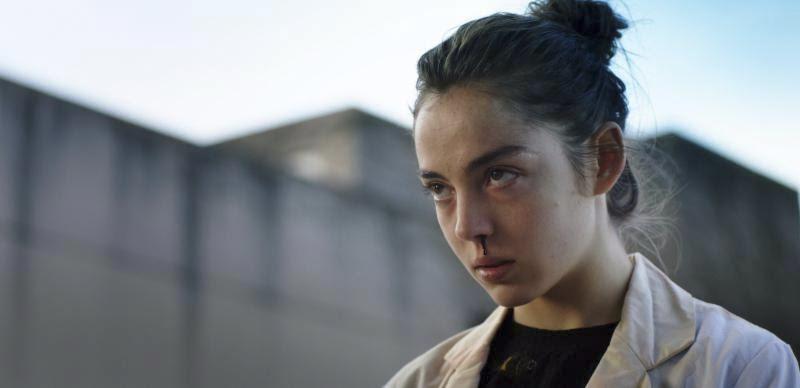‘Raw’ Gnaws Through Expectations of Female Sexuality
Garance Marillier plays Justine in “RAW,” the visceral winner of the 2016 Cannes Film Festival’s FIPRESCI Critics Prize.
March 6, 2017
The story of a girl’s coming of age through sexual and intellectual exploration paired with the strange desire for raw meat could have easily fallen into the campy, B-list horror genre like the many cannibal films that preceded it. But French filmmaker Julia Ducournau’s “Raw” chooses a different route. While the consumption of human flesh is a major aspect of the film, Ducournau honors the gory endeavor with style and pacing that induces stress rather than pure horror.
The film begins with a middle-aged couple dropping off their innocent — and ill-prepared — daughter Justine (Garance Marillier) on her first day of veterinary school. In what would have been a banal and commonplace segment in any other film, this scene indicates none of the unapologetic gore that soon follows. It does, however, establish the narrative tone, through which every scene in the movie — including awkward first meetings between roommates and traumatic university hazing rituals — is beautiful to look at, designed to heighten the viewer’s awareness of human bodies and the fleshy sinew that binds them together.
With a small cast, “Raw” relies heavily on its actors to handle the absurd plot. Marillier’s stunning performance is steeped in subtlety, something difficult to achieve given the sensational subject matter. Justine is juxtaposed with her older sister (Ella Rumpf), who studies at the same school, and embodies the role with equal finesse.
From the moment Justine steps onto campus, any social expectations she had are thrown out the window. Her parents are no help to her, her sister treats her worse than the upperclassmen do and she has no one with whom to discuss her newfound desire for raw meat after being forced to eat a rabbit kidney in a hazing ritual. The film’s absurdity is not found in a woman discovering she has an appetite for flesh, but in the disorienting environment she is forced to navigate before she can begin to understand what is happening to her.
She nervously chews on her hair, eventually running to the bathroom to vomit. Like a disturbing circus act, she gags up handful after handful of hair. On the surface, this film is about cannibalism and unrestrained female desire. But scenes where girls are so anxious that they chew on their hair despite physical repercussions is anything but absurd — in fact, it’s painfully real.
Using a hyperbolic social taboo, Ducournau addresses issues surrounding female sexuality and communication. If women were encouraged — or at the very least, allowed — to express questions or concerns surrounding desire and sexuality, perhaps they wouldn’t be resorting to eating hair and pinky fingers. Instead, Justine’s unnatural desire is suppressed, causing disastrous results for the characters.
While many concealed desires aren’t as taboo as eating flesh, one wonders if men are only allowed to express nontraditional preferences when they are billionaires and named Mr. Grey. It seems like men get a pleasure room, while women are murderers.
“Raw” will open in theaters on Friday, March 10.
A version of this article appeared in the Monday, March 6 print edition.
Email Sydney Rappis at [email protected].
























































































































































